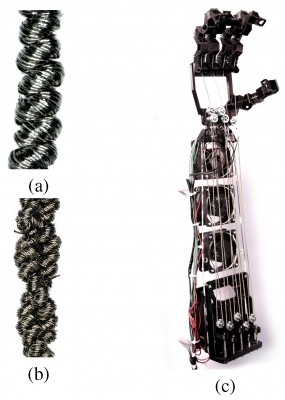High-Performance Robotic Muscles from Conductive Nylon Sewing Thread
In this paper, we develop a thermomechanical and thermoelectric model of SCP actuators, and examine their controllability.
May 26, 2015
IEEE International Conference on Robotics and Automation (ICRA) 2015
Authors
Michael Yip (Disney Research)
Günter Niemeyer (Disney Research)
High-Performance Robotic Muscles from Conductive Nylon Sewing Thread
Natural muscles exhibit high power-to-weight ratios, inherent compliance and damping, fast actuation and high dynamic ranges. Unfortunately, traditional robotic actuators have been unable to attain similar properties, especially in a slender muscle-like form factor. Recently, super-coiled polymer (SCP) actuators have rejuvenated the promise of an artificial muscle. Constructed from commercial nylon fishing line or sewing thread and twisted until coils form, these lightweight actuators have been shown to produce significant mechanical power when thermally cycled. In this paper, we develop a thermomechanical and thermoelectric model of SCP actuators and examine their controllability. With off-the-shelf conductive sewing thread, we show the ability to produce controlled forces in under 30 ms, exceeding human muscle performance. Finally, we use SCP actuators in a robotic hand to demonstrate their applicability as a low-cost, high-performance robotic muscle.

